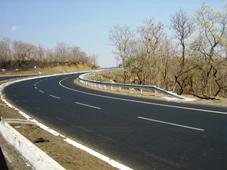 Building 20 km of highways a day -- United Progressive Alliance II government's ambitious target-- is not sustainable because of reasons like delays in environment clearance and issues of land acquisition, highways authority NHAI said on Thursday.
Building 20 km of highways a day -- United Progressive Alliance II government's ambitious target-- is not sustainable because of reasons like delays in environment clearance and issues of land acquisition, highways authority NHAI said on Thursday.
"Building 20 km (of roads) a day target is not sustainable.
"There is no point in rushing up with projects where we do not have environment clearance, we do not have land acqusition. . . We must deal with these projects in a way the private equity gets interested," National Highways Authority of India Chairman R P Singh told reporters.
He said raising equity was a major concern for awarding road projects of 10,000 kms a year, including 7,000 km of national highways.
It requires Rs 90,000 crore (Rs 900-billion) investment, of which one-third (Rs 30,000 crore or Rs 300 billion) should be private equity.
"Can we really raise Rs 30,000 crore (Rs 300 billion)
equity," he wondered while stressing the need for making road projects lucrative.
Achieving up to 60 per cent of the target would be meaningful if the government manages to maintain current rate, he said on the sidelines of a Federation of Indian Chambers of Commerce and Industry conference on highways.
His remark comes at a time when NHAI has barely managed to award about 1,000 km of contracts so far this fiscal as against a target of 9,500 km fixed by the Road Transport and Highways Ministry.
"We will certainly exceed (award of contracts for building) 2,500 km. We fixed our internal target at 3,000 km," Singh said.
The UPA government in 2009 has unveiled its ambitious target of building 35,000 km of highways in five years, which translates into constructing 20 km of roads in a day.
So far, the target was never achieved and even Prime Minister Manmohan Singh had expressed concern over it.
Private developers have not shown any big interest of late in bidding for highways projects.
© Copyright 2025 PTI. All rights reserved. Republication or redistribution of PTI content, including by framing or similar means, is expressly prohibited without the prior written consent.

 Building 20 km of highways a day -- United Progressive Alliance II government's ambitious target-- is not sustainable because of reasons like delays in environment clearance and issues of land acquisition, highways authority NHAI said on Thursday.
Building 20 km of highways a day -- United Progressive Alliance II government's ambitious target-- is not sustainable because of reasons like delays in environment clearance and issues of land acquisition, highways authority NHAI said on Thursday.